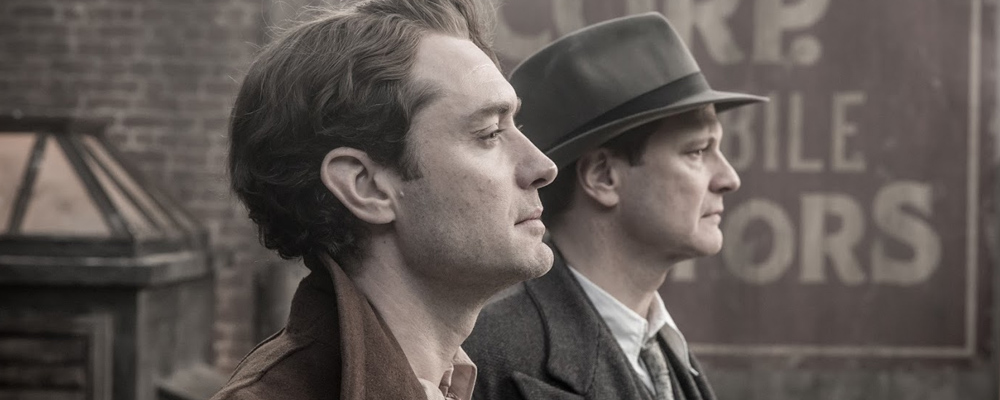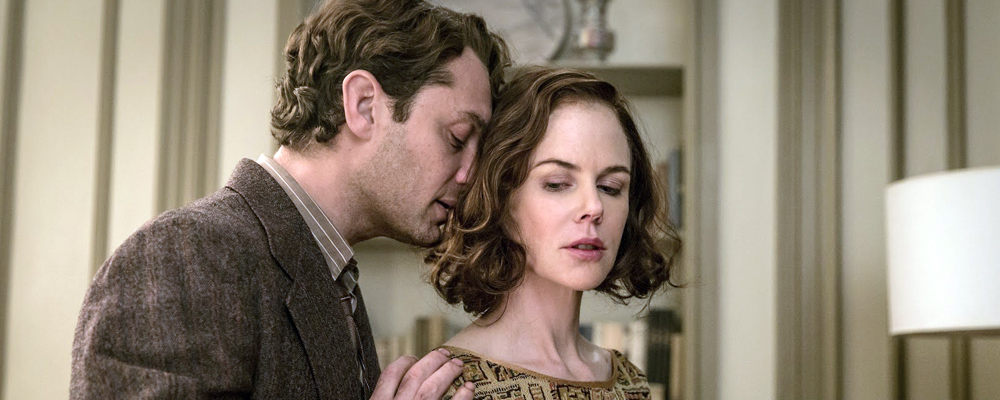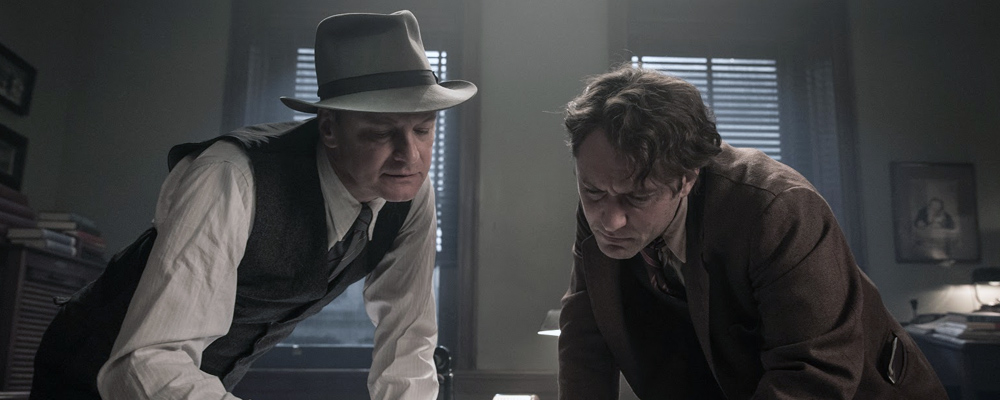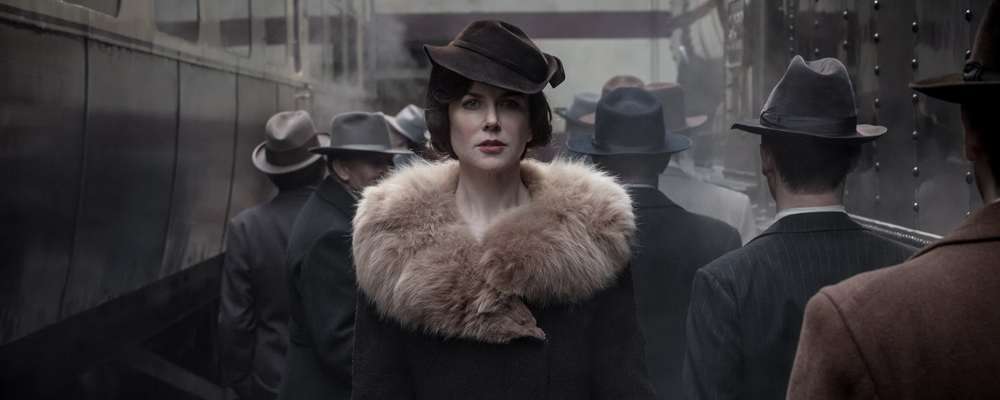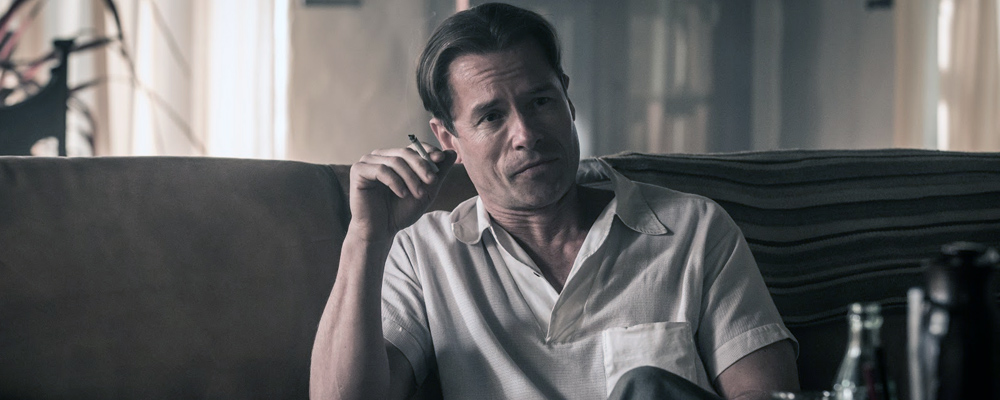Director Michael Grandage Shares His Insight on the Dynamic Relationships and Collaborative Storytelling That Inspired ‘Genius’
Allyson Gronowitz
Michael Grandage is a household name for theater buffs. From ‘02 – ‘12, he served as Artistic Director for London’s Donmar Warehouse and four years ago he established his own company and produced John Logan’s “Peter and Alice” starring Judi Dench and Ben Whishaw; Martin McDonagh’s “The Cripple of Inishmaan” with Daniel Radcliffe; and “Henry V” starring Jude Law, among many others. Grandage has earned his stripes as a venerated theater director but the newly-released “Genius,” starring Colin Firth as prolific editor Maxwell Perkins and Jude Law as ebullient literary sensation Thomas Wolfe, marks his first foray to the silver screen. Grandage previously worked with Law, screenwriter Logan and ‘Genius’ co-star Nicole Kidman on various London theater productions.
Grandage spoke with Entertainment Voice about falling in love with John Logan’s screenplay, the excitement of working on his first film and how Jude Law came to play the larger-than-life character of Thomas Wolfe.
What was your initial reaction to John Logan’s screenplay?
I was sent the screenplay by John Logan because we were working on a play together, so we were getting much closer creatively and we were very aware that we shared the same aesthetic. He was talking to producers and directors about this movie, Colin Firth was already attached to the movie and just as a friend— a collaborative friend— he said, “I’d love for you to read a screenplay that I’ve had for 14 years just to tell me what you think of it.” I read it because there was absolutely no agenda. I read it on the airplane and was phenomenally moved by the central relationship because I was aware, from a filmic point of view, that all films succeed and sometimes fall by a very strong central relationship and here was one at the center of this film.
Also, speaking a little for the work of a director, one of our great privileges is that we get to work with some extraordinary, talented people. I was reading this screenplay and I thought, My God! I know it’s the story of an editor but it’s also the story of a director; it’s also the story of all these people who go into collaborative relationships and work with these extraordinarily creative artists. So I’m quite aloft on it. When I got down on the ground, I wrote an email to John Logan telling him how much I enjoyed it, why I’d enjoyed it and how profound I thought it was. And then I didn’t think any more of it. But of course, John Logan received this email and he thought, Hang on a minute. Why don’t I just ask him to direct it? Nobody else has reacted like this. Why don’t I ask him to produce it as well since I’d just formed a production company of my own to give myself a bit of freedom to do theater work, opera work and film work if I wanted to do it. So, suddenly, having just innocently read a script for a friend, I found myself being offered to direct and produce.
You’re a longtime theater director but this is your first feature film. How much of a learning curve was there for you, getting behind the camera?
[laughs] Yes, yes, it was terrifying! It was a huge learning curve. But the great joy about the film world is that there have been quite a few theater directors who have gone into it – Sam Mendes and Kenneth Branagh [are both] friends and colleagues back in England. I was able to talk to them, visit them in editing rooms on set, visit orchestra rehearsals and see everything that I possibly could before I did my own film. I tried to get as much information as possible. But the truth is when you come to do it yourself – when you’re ready to start the pre-production and then the shoot and then the editing and then the post-production – that’s all stuff that you give a year and a half of your life to. For me, every single bit of it was out of my comfort zone because I was doing something new. I have to tell you – and I kind of recommend it to anyone – that the great joy of getting out of your comfort zone as you get older is that it really does liberate you from something. You think you’ve settled, you think you know the job you’re doing, you think you know what to do and how to do it and then suddenly you’re challenged every single day of your life. Every single day is a new day you’ve never experienced before and that’s one of the reasons I think I found this whole process completely exhilarating and completely wonderful. I don’t have a negative story about my experience on this film other than the terror of going into it and wondering if I was going to be able to do it. But then the moment I immersed myself . . . it was just a completely fulfilling journey.
Challenging yourself by working outside of your comfort zone sounds a lot like what went on in the relationship between Max Perkins and Thomas Wolfe.
That’s right! And that’s why I think I loved [the screenplay] so much because there were so many parallels. Over the last 10 years, when I was running the Donmar back in London, I had been sent a few screenplays and I was very aware that I couldn’t leave the theater to do a film because I didn’t want to abandon everybody. The truth is, I never got a screenplay that conflicted me in that way. But when I read this, there were so many personal parallels, there was a whole beautiful story of fathers and sons in there, there’s a wonderful story about creative collaboration and there’s a wonderful story about the heartache and problems that come with the process of writing and creating. The whole thing spoke to me on a deep, deep level and that was the reason I knew that this was the first film I should try and tackle.
Regarding the creative process, the film presents several different writers and their artistic approaches. Is this exploration of the creative process something you specifically wanted to explore in the film?
I think so. It’s quite an important part of it for me. The funny thing about directing is that there isn’t a single way to do it. Every director is different, every director has their own personal process and they come to it and work with actors and designers in a different way. The film honors all of those ways of working and I think that’s the other reason it spoke to me in such a significant way. There are as many ways to direct a film or a play as there are directors to do it. The only thing we all share is that you’ve agreed to start on this date and deliver on this date and how you get from date “A” to date “B” is a very, very personal process. And you have to bring a whole load of people with you behind the vision of the piece and collaborate with them and get the best out of everybody. I saw all of that as a parallel with what goes on in the film with the various authors that Perkins [manages]. It’s only in brief that you see his relationship with Fitzgerald and with [Ernest] Hemingway but at least it gives the audience a taste of those relationships.
The film manages to dramatize the sometimes tedious, frequently mundane process of editing. How did you approach the challenge of portraying this onscreen?
If the writer who Max was dealing with was economic in their prose and the editing process was actually about some kind of work on what to do with punctuation and the endless discussion of whether a sentence could be better balanced, then I think it probably would be quite a boring process to watch. But I was given a gift because Wolfe just wrote and wrote and wrote and wrote . . . and therefore the challenge was – and of course, this is the central dilemma of the film for Max as well— how do you not destroy this work while actively reducing a whole page of prose down to just three lines? [Wolfe] sits down and reads it so that the audience actually hears it; all about the blue of the eyes and that little sequence and, hopefully, the audience is beguiled by it in the same way that Max is beguiled by it in the same way that Thomas Wolfe believes it’s wonderful. It is wonderful but now the task is to make it very, very tight. Now, that should be interesting to watch! How do you get from – I’m making this number up – 32 sentences to four sentences; How do you do that? It, therefore, shouldn’t be tedious. It should involve a lot of heartache and a lot of temperamental relationships. But it’s a creative process, and you get the final four lines at the end of the sequence and realize you’ve been on a journey. I suppose the reason, cinematically speaking, that it works is that you have quite a strong narrative arc.
Colin Firth was already on board by the time you joined the project but what went into the decision to cast Jude Law as the effervescent, high-energy Thomas Wolfe?
In his case, it was because I’d worked with him and I knew that I wanted an actor who was fearless to take on Wolfe because I knew it was going to have to be a huge performance. I knew I wanted an actor who had very little vanity, very little self-editing and who trusted somebody else to do the process of guiding the performance rather than stopping themselves from doing something. I knew I wanted an actor who dared himself to go to really big places. Because I’d done three plays with Jude, I’d seen a wide variation of the way he approaches text and the way he approaches a character and I knew he would go to the extremes necessary for Wolfe to come alive. There’s no point in doing this film or in telling this story in any form if you’re not going to show the extremity of a character. I know it’s uncomfortable sometimes for people to watch, and indeed, some of the reaction to him is, “Oh God, is the performance too big?” But it couldn’t be too big. Frankly, we could have done it bigger and it still wouldn’t be as big as the Thomas Wolfe we’re reading about.
The other thing was an entirely practical reason, which was going back to what I said earlier about being out of my comfort zone – the one thing that might be rather helpful for me going into this first film would be to have a relationship with some of the actors so I didn’t have to worry about building the trust on set but to know that we were going into the process with that trust already in place. With Jude and with Dominic West, who played Hemingway and with Nicole [Kidman, who played Aline Bernstein], there was a relationship there. That just made it easier because it means they didn’t turn up [wondering], Can he direct? Who the hell is he? Am I gonna trust him, or should I just do my own thing? And I was there [thinking], Right, here we are. We’ve got a relationship, let’s collaborate.
There’s a scene where Wolfe drags Perkins to a jazz club and explains that this type of music typifies “the dark rhythms that inspire” him. The film as a whole features a cacophony of sounds such as the stomping of feet and the clacking of typewriters. How does the jazz scene exemplify Wolfe’s unique worldview?
You’ve got it exactly right. The jazz scene is a metaphor for the whole of Wolfe; His life is about extremes in every way. Apparently he smoked a hundred cigarettes a day, sometimes he drank a bottle of scotch a day – nothing was done in moderation with Thomas Wolfe and the jazz scene is a perfect example of this. His life was loud, his life was fantastic. His life was meaningful in an introverted way and then he expressed himself in an extroverted way. He was every single contradiction. So to go into a jazz club for a night of bourbon and listening to jazz, being [immersed] in an atmosphere full of smoke, full of life . . . it’s a perfect parallel to trying to create something about Thomas Wolfe’s character. So, you’re absolutely right to identify that as being a pivotal scene in terms of understanding a bit more about Wolfe’s personality.
The jazz club scene is also a great instance in terms of delineating their different personalities while also showing how they manage to get along despite those differences.
Yeah, it’s the central scene in that respect as well because it’s also the scene where they begin to understand one another – or perhaps Max finally understands Tom and actually releases himself a bit. [Max] sits down and says, “I’ll have a martini,” and he’s overridden by Wolfe, who says, “No, to hell with that, give him a bourbon!” And then [Max] starts trying to understand the jazz piece, and he gets into that. But crucially, come the final moment when Wolfe says, “Now you’ve drunk with me, you’ve jazzed with me, you’ve gone to the place I love, you understand me there . . . let’s go and have some women together as well,” Max draws the line. But, brilliantly, I think, he says, “To be very clear, I’m not stopping you. I don’t want to do that bit but I’m giving you free reign. I don’t disapprove of you doing it.” I think it’s a pivotal scene in more ways than one.
There are so many different storytelling elements at work: it’s a movie about a book and there’s also a play, and we just discussed that crucial jazz scene. How is the film a love letter to all different methods of storytelling?
You’ve identified, I think, why when I was on that airplane reading it for the first time I got so much out of it. I thought the job that I’ve made for myself in life is about telling stories. It’s about finding a great narrative and engaging with an audience and taking them through it and, most importantly for me, moving the audience with that story. Suddenly, this screenplay came to me that took on so many different areas [of storytelling]. It was just the greatest gift of a screenplay I could ever get.
“Genius” opens June 10 in limited release across the United States.

